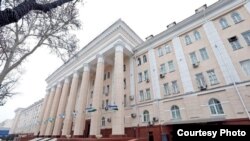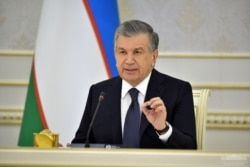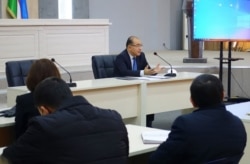In Uzbekistan, the fight for greater press freedom is at a turning point as journalists push back against warnings from the government media regulator that coverage of issues, including the pandemic and energy shortages, is in violation of legal norms.
The Agency of Information and Mass Communications, which has power to revoke media licenses, has accused nearly a dozen outlets in recent weeks of unprofessional journalism and warned it could take action against them over a range of alleged violations, including misinterpreting statistics, amplifying anti-government sentiment, and diminishing the state's role and image.
But journalists argue their work reflects the realities of today's Uzbekistan. The state demands media perfection, they say, but cannot meet its own standard if its response to criticism is resonant of the repression under the strongman leader Islam Karimov, who ruled for 27 years before his death in 2016.
"Our content is as accurate and balanced as possible under current circumstances," said Qamariddin Shaykhov, founding director of Qalampir.uz, a website known for breaking news and its sensational-style reporting and interviews with political and business figures. "Instead of supporting media development, the government looks at us with suspicion," he told VOA.
A burst of new platforms, mostly founded by young journalists, bloggers and entrepreneurs, have emerged in Uzbekistan in the past five years. When Shavkat Mirziyoyev came to power in late 2016, he promised Uzbekistan would open up to the world — and to critical voices at home.
Up to that point, the former Soviet republic was one of the most closed societies in the world, with a human rights record described by Freedom House as the "worst of the worst." The only independent journalism took place outside the country's borders, and authorities jailed critics and blocked access to websites.
Despite Mirziyoyev's reforms, including the release of journalists imprisoned for lengthy periods, Uzbekistan is still rated "not free" by Freedom House. But a new generation of journalists believe that Uzbeks have more access to information and benefit from a daring domestic media that is now willing to cover sensitive, complex and fraught issues that directly reflect the public's lived reality.
Red lines still exist: There is no direct criticism of the leader. But news sites under the national .uz domain see themselves as guardians of this new Uzbekistan. They have gained credibility by reporting on local issues, corruption, injustice and, more recently, energy cuts and pandemic-related problems.
Journalists at these sites have raised the bar for journalism in Uzbekistan — a bar the state now threatens to lower through warnings and punishments, media advocates say.
Shaykhov said the state has double standards: President Mirziyoyev encourages journalists to serve as agents of reform, yet his regulators keep tightening the rope.
Media development
Publicly, outlets like Kun.uz, Gazeta.uz, Daryo.uz and Qalampir.uz have responded differently to the regulator's letters: Kun.uz called the warning direct pressure; Daryo.uz downplayed the significance.
Still, in columns, editorials and interviews, including with the Voice of America, leading Uzbek journalists raised questions about the role of government in media development.
Uzbekistan, they argue, has never been a society where reporters and editors could work without fear of persecution and harassment. And they ask on what political and moral basis the state can define what constitutes "professional" journalism.
The U.S. Embassy in Tashkent also criticized the warnings, saying it was disappointed by the agency's response. "To succeed, Uzbekistan's ambitious reforms require a free & open press. AIMC pressure not consistent with this," Ambassador Daniel Rosenblum said in a November 28 tweet.
In response to media and public outrage, the regulator said that ensuring freedom of speech was "a top priority."
In a November 27 statement, the agency said it was committed to supporting journalists but that it has seen several cases of "inaccurate" coverage, especially on coronavirus and an energy crisis.
The regulator said it offers opportunities to support coverage of the government and other sectors, pointing to hundreds of briefings and events as examples of transparency and accountability.
But the agency "has a double-edged function," wrote lawyer-turned-blogger Zafarbek Solijonov in Tashkent. "To support — and regulate. Its success depends on a well-balanced approach."
The record is mixed. Revamped two years ago as a media reform engine, the agency was run by Mirziyoyev's former press secretary Komil Allamjonov and his daughter Saida Mirziyoyeva as a deputy. Leveraging direct channels to the leader, this tandem removed some long-standing restrictions on international news and human rights websites.
Yet the office was also a vigilant regulator, sending cautionary letters to outlets that transgressed its red lines. Allamjonov and Saida Mirziyoyeva left earlier this year to form a public fund to support Uzbek media and promote the president's agenda from a nongovernmental platform.
Allamjonov, who in 2016 launched his own channel, Milliy TV, sees the current pushback against the media regulator as a sign reforms are working.
"The fact that media are not afraid to complain of pressure and are fighting for their interests is a milestone," Allamjonov said in a recent Telegram column. The response to the regulator's warnings shows that Mirziyoyev's road map on freedom of speech and expression is working, the former agency head added.
Allamjonov predicted a rocky road with some resistance, but said he believed the country would continue to learn the value of critical media and public debate.
Asadjon Khodjaev, Allamjonov's successor at the media regulator, is widely viewed as a representative of an old guard that aims to slow or stall reforms.
Khodjaev was recently cited by local reporters as saying he stands for independent and reliable media, opposes censorship and persecution of journalists, and values critical press.
But Khurshid Daliyev, a blogger and founding director of Human.uz, describes Khodjaev as a bureaucrat asserting power.
Daliyev's site, which is known for investigative reporting on economic and social issues, has not received letters recently from the agency. But, Daliyev said, he sees no legal or professional basis to question content that covers issues such as the shortage of natural gas and electricity, or challenging the accuracy of pandemic-related numbers.
While some journalists shrug off the warnings, others have said they are considering quitting because of pressure.
Akmalkhon Eshonkhonov, who founded Effect.uz about a year ago, told VOA the site is considering surrendering its license after receiving a warning for "inciting religious conflict" in its reporting. The regulator did not specify which report led to the warning.
A November 28 editorial in Effect.uz implied the site may move to a non-Uzbekistan domain, beyond the authorities' reach.
Qalampir.uz predicts others could do the same: Leading sites may abandon the .uz realm to avoid state licenses and, as a result, the public may rely more on foreign-based media.
"Is this what the government wants?" asked Shaykhov. "To nullify hard work done over four years and, despite promises, go back to where we were?"
Shaykhov grew up under Karimov, studied journalism in Uzbekistan, and carved out a career creating new media. He believes the current pressure hurts the public and state, exacerbating the gap between them.
"We are not enemies. Journalists genuinely intend to help this society move forward."







